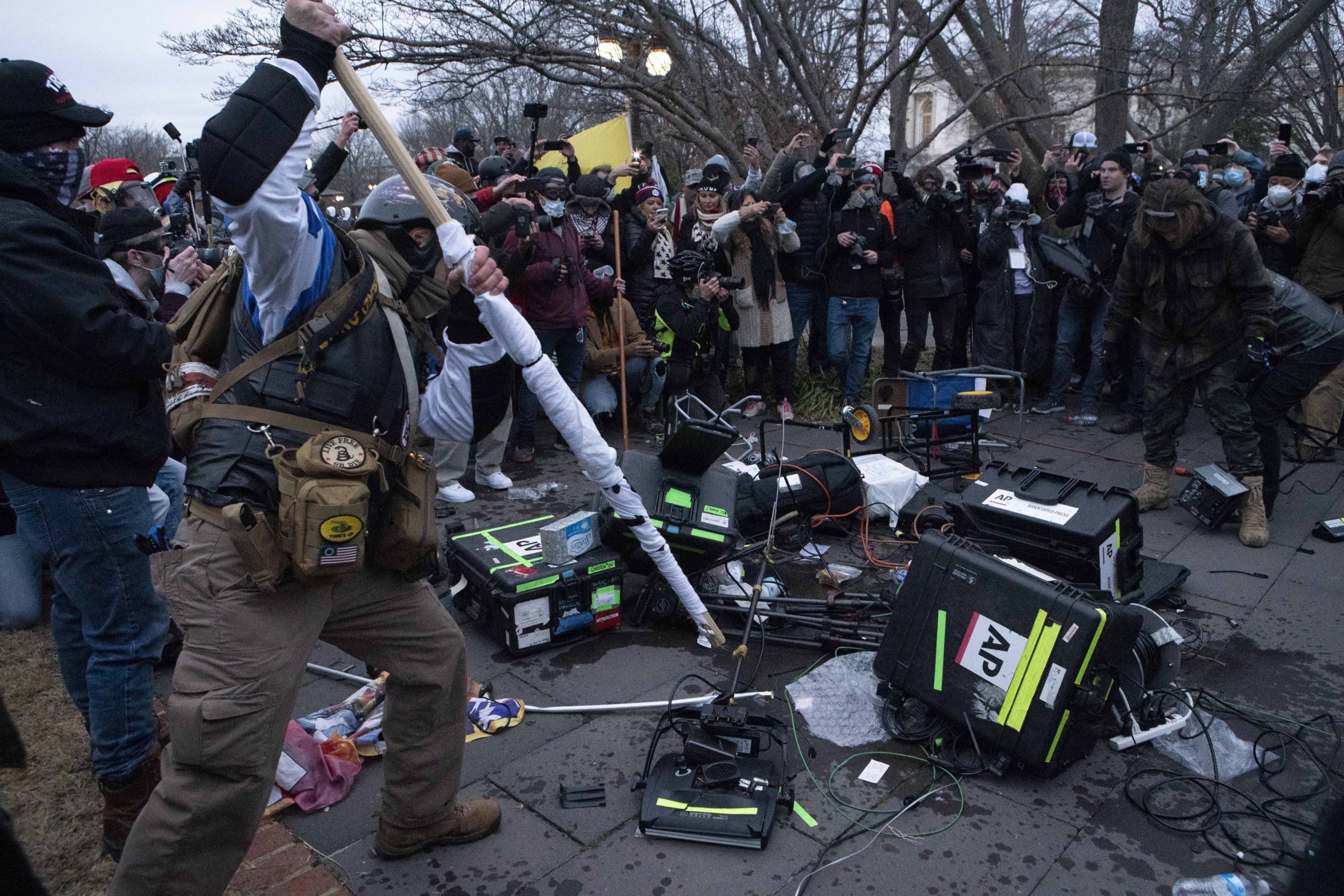
Demonstrators break TV equipment outside the the U.S. Capitol on Wednesday, Jan. 6, 2021, in Washington. Democracies across the globe have been under threat in the past decade — including in the United States
If I asked you to name a country where press freedom has grown stronger in recent years, could you? How about countries where press freedom is increasingly under attack?
If you’re still struggling with the first question but can easily answer the second, it’s for good reason. Journalism, already weakened by industry economics, is running a gauntlet of abuse around the world. “Press freedom predators,” as Reporters Without Borders has named them, now sit at the top of a lengthening list of governments.
But the price is greater than journalism — it’s democracy.
“There is no question we are living through a democracy recession,” said Michael Abramowitz, president of Freedom House, whose global research on democracy and civil liberties includes measuring the health of journalism. In each of the last 16 years, more countries have experienced democratic declines than improvements, in good measure because of lower scores for freedom of the press.
“It’s not the only factor — there’s also corruption, lack of transparency, lack of free and fair elections,” he added. “But the decline in respect for the free press is clearly a big part of this. We are in a very difficult situation and focusing on protecting journalists and their ability to do their jobs safely and helping to make journalism more economically viable is critical to restoring democracy.”
I reached out Abramowitz because I wanted to check my Nieman experience against the long view of Freedom House, which has been monitoring democracy since 1941. Certain countries that once posed modest or manageable threats to journalism in my decade as curator now loom as dark clouds, the dangers personified by a roster of recent Nieman Fellows. Russia, Myanmar, Hungary, Hong Kong, Brazil, India, Venezuela, Poland, the Philippines, Turkey, Mexico, China, Colombia, Nigeria, and Ukraine are among the countries populating my personal map of worry, each place home to journalists whose battles against authoritarianism, violence, and more I’ve come to know well.
“I think we’re on a terribly dire course right now,” concurred Abramowitz, a former editor and White House correspondent for The Washington Post. “All the threats to journalism today are honestly to me so much greater than when I was a journalist.”
Those threats are fourfold: violence; cyber campaigns attacking journalists and spreading propaganda such as the one President Rodrigo Duterte undertook against Filipino journalist Maria Ressa; economic intimidation, which Prime Minister Victor Orbán mastered in Hungary; and authoritarians who work to influence and intimidate journalists beyond their own borders through pressure, imprisonment, or worse.
“That’s what the murder of Jamal Khashoggi was all about,” said Abramowitz.
In Nieman Reports’ Reporting at Risk series, journalists from around the world examine the risk to the news ecosystem in their regions and strategies for how to combat a clear anti-press spiral. While the U.S. still upholds laws that protects journalism from some of the worst abuses, it would be naïve to believe the country is safe from decline in press protection.
“In the United States, once considered a model for press freedom and free speech, press freedom violations are increasing at a troubling rate,” said Reporters Without Borders in this year’s World Press Freedom Index. That index ranked the U.S. 42nd out of 180 countries, an anemic standing for a nation whose origin story is rooted in press rights. The organization attributed the ranking to factors including online abuse of journalists and the unprovoked “harassment, intimidation and assault” reporters endure in the field.
Moreover, some government officials in the U.S. have played a shameful role in delegitimizing the media at home and abroad, spreading anti-press rhetoric that gives succor to despotic regimes around the world. The term “fake news” is a deadly American export, one used to devastating effect by Vladimir Putin since the start of the Ukrainian invasion. And as Emre Kizilkaya writes, Turkish President Recep Tayyip Erdoğan is using the same language to push through a so-called “disinformation bill” that would represent “an unprecedented attempt to suppress journalism in Turkey.”
History moves in waves, Abramowitz said, and he hopes for a democratic wave to serve as a corrective for current conditions, much as the collapse of communism once did. He points to countries including South Korea, the Czech Republic, Taiwan, and the Baltic states as signs of democracy’s health, and hopes the war on Ukraine will ultimately offer a corrective. “People are seeing the consequences of unchecked authority in Russia,” he said. “I’m hoping it has a salutary effect.”
The alternative is clear, as summarized in a sobering Freedom House report on the fragile state of the world’s journalism.
“If democratic powers cease to support media independence at home and impose no consequences for its restriction abroad,” it warned, “the free press corps could be in danger of virtual extinction.”


